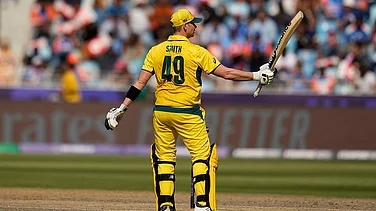“Mira, mira… (“look”, or “here”), says a blonde, curly-haired La Liga representative in Spanish during a special screening of the Barcelona-Real Madrid El Clasico in a Mumbai mall on Sunday, October 16. (More Sports News)
She points to chairs for an interview with Patrick Kluivert, the former Holland and Barcelona star.
The 46-year-old Kluivert looks relaxed as he sits, wearing Travis Scott-Air Jordan sneakers and bracelets on his wrist. He is retired and all he has to do, as La Liga ambassador, is some schmoozing, selfies with fans and press.
But Kluivert has also been in the hot seat of having to play big games. He knows the pressure a player faces from the screaming cliffs of the Bernabeu or the Camp Nou. By extension, he knows the importance of mental health, which the Indian cricket legend Kapil Dev spoke about in a flippant way recently.
At an event organized by an educational institution, Dev called depression and pressure “American” concepts. Perhaps, his intention was to downplay things and assuage the fears of students. But he came off sounding insensitive.
Kluivert seems more accepting of the hazards of pressure. “Load” is the word he uses.
“Every time, you prepare yourself for a game normal [follow the process and keep things simple], as the load of the game is very high,” says the former striker, the youngest ever to score in a Champions League final. (He was 18 years, 327 days old when he netted for Ajax against AC Milan in 1995).
The mental side, Kluivert says, has become more important due to various reasons. In part, he says candidly, it is due to the players’ own choices.
“Nowadays, players can be focused on other things, beyond football. That’s the thing that needs to change. Everybody likes football, but some side effects [of a footballers’ life] can disturb the quality of the football,” he says.
He agrees social media is a big factor. But so is money, he says, rubbing his fingertips.
Talent is surrounded by well-wishers as well as parasites. Sport’s often murky underbelly of agents and deal-making often puts players and their families into stressful situations. But then, players too are inclined to chase big bucks. It all adds to their pressure.
“The environment and the people you are surrounded with, those are very important for a professional footballer,” says Kluivert.
Returning to Kapil Dev, he might have expressed a more considered view of depression and mental health had he factored in that his contemporary Richard Hadlee suffered depression at the prime age of 32.
Hadlee’s is a fascinating case study and relevant even today. It educates us on the various forms of mental health crises. Most athletes get their mental demons from failure. Hadlee’s were a result of success.
The year was 1983, further proof that mental health is not necessarily a modern malady. Hadlee was a huge star in New Zealand and in demand everywhere. He said yes to everything that was asked of him, a bit out of politeness and certainly, to some extent, to cash in while the going was good.
What followed was burn-out, a caving in of the beams and columns of a human mind.
"A lot of people would want you to do things: `Can you appear here? Can you do this? Can you do that?' You didn't want to let them down. And so being a `yes' man, you are on a plane going up and down the country appearing in three or four events a day,” Hadlee said in an interview. “Then it starts to get on top of you and boy, you get into a real hole.”
He added, "I had no desire or strength to train or run a lap of the park. I was mentally and physically exhausted. Some of the symptoms I had were headaches, heart palpitations, dizzy spells, total negativity to everything. As time went on you have a lot of self-doubt and you start thinking very negatively and questioning the will to live.”
Do note that this was Hadlee, not a Twitter generation athlete but an old-school warhorse. It shows mental health issues can sneak up on anyone when the body or mind get pushed too much.
Another example of success leading to a mental breakdown is Chloe Kim, the American Winter Olympics double gold medallist.
Kim is a snowboarder, and South Korean by ethnicity. She won her first medal of note at age 13, at the 2014 X Games, and happily posted a picture on Instagram.
What followed shocked her. Some people told her to go back to her country of origin. They blamed her for eating into the medal share of white Americans on the team.
“I ended up crying myself to sleep on the best night of my life,” she told ‘Time’ in an interview.
Even as a grown-up, the assorted pressures of an athlete’s life left Kim so empty and disillusioned that she once tossed her Olympic gold medal in a trash can at her parents’ home. To an outsider this may seem bizarre and thankless behavior, but pressure can do that to a person.
It is true that sport is about competing. Top level athletes are also well-compensated and get a free pass on a lot of things people in other careers don’t. They must be prepared to take the heat. But when they break down, they need to be understood, not scoffed at.


























